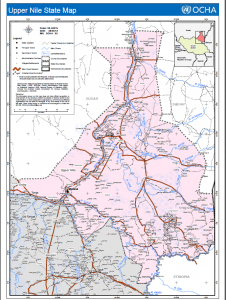
- Capital: Malakal
- Approximate population: 964,353
- Internally Displaced People (IDP) sheltering in Upper Nile: 194,200
Upper Nile State is situated in the north-east, bordering Ethiopia and Sudan. It is considered a marginalised state, heavily affected by decades of civil war and with poor infrastructure and accessibility (especially in the rainy season). Although imbuing areas around Renk and Melut with high strategic significance, the state’s oil reserves have so far provided limited benefits to the local population.
Along with Unity State and Jonglei, Upper Nile has been one of the battlefields of the internal conflict which erupted in December 2013. Violence spread to Upper Nile shortly after the first incidents in Juba and, what was later to be named the SPLA-in-Opposition (SPLA-IO) attacked the state capital Malakal 24 December 2014. Between December and April, Malakal changed hands six times and with each battle the number of refugees and IDPs increased. The White Army and the South Sudan Democratic Movement/Army, a Shilluk militia, also joined the fighting. In Unity State the conflict has not only been about high politics; it has also involved local issues and armed groups mobilised on a community basis, a consequence of weak state control following decades of civil war.
The fighting has largely been focused around Malakal and on access to the oil fields in Upper Nile State. SPLA is currently in control of Malakal, but the areas on the west bank of the Nile are still contested and fighting continues despite the peace negotiations. Baliet town is a hot spot since it links Malakal to Nasir (and further to Ethiopia). To the west, Tonga is a gateway to Malakal and was targeted early in the conflict. Since April, Renk county, the base of SPLA’s first division, and Maban county have also become frontlines as the areas hold military and financially strategic value. The situation in Maban is further complicated by the four major refugee camps which are hosting more than 127,000 refugees from the civil war in the neighbouring Blue Nile state of Sudan.
Gross human rights violations have taken place in Upper Nile. Attacks on churches hosting IDPs, house-to-house searches and civilian killings in Malakal hospital have been documented. UNMISS uses its bases in Malakal, Nasser and Melut as civilian protection sites and has recently opened an additional site in Malakal as the bases are filled beyond capacity. Under the current circumstances it is impossible to provide any reliable number of the people facing severe food shortage and lack of basic services in Upper Nile. However, there is no doubt that an already fragile situation has been made worse by the fighting which has caused displacement, hindered local food production and made trade difficult.
Further resources:
- Small Arms Survey: The conflict in Upper Nile State
- UNMISS: Conflict in South Sudan: A Human Rights Report
- BICC: Oil Investments and Conflict in Upper Nile State, South Sudan
Leave a Reply